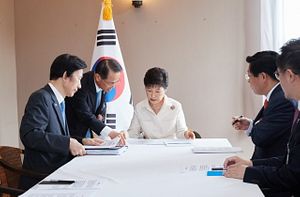Buses were detoured on Wednesday afternoon as a parade of angry South Koreans marched toward Seoul City Hall. Every day in Gwanghwamun at the foot of the presidential palace, scores of police in neon-green jackets run drills as evening falls.
After thousands flooded the streets of downtown Seoul last weekend, public unrest has only begun. Civic leaders are pressing for another rally Saturday that promises to be even bigger as citizens repeat their call for President Park Geun-hye to step down.
They are no less outraged at the scandal engulfing the presidential Blue House, which centers around Park’s decades-long confidant Choi Soon-sil peddling influence over state funds and decisions, than they were when the news first snowballed last week.
An emotional Park apologized “wholeheartedly” Friday for complicity in Choi’s influence over government affairs, capping off a week that saw her old friend jailed, her secretariat swept out, and her ratings continue a historic slide for the third straight week, finally landing at 5 percent.
In her Friday address, Park also volunteered to be subject to a probe, tentatively becoming the first South Korean president to be investigated while in office. Citing grief over her failures, including letting her decades-long friendship get the best of her objectivity, Park vowed a life of solitude.
She is, indeed, already alone. Her former aides are one by one testifying that they were accessories in Choi and Park’s games. Ousted senior secretary Ahn Jong-beom, who allegedly strong-armed conglomerates into “donating” to the nonprofit organizations controlled by Choi, has stressed that he did everything under the president’s orders, not his own initiative.
Park spent the week cleaning out her secretariat, along with the prime minister, who was not implicated in her alleged crimes, as a symbol of a fresh start. But her loneliness at the top has her appearing like a puppet without its marionettist.
She chose a prime minister who once served the liberal President Roh Moo-hyun, in a bid to appease the opposition. Instead they responded with outrage, with the nomination almost sure to be blocked by the majority liberal bloc.
Her replacement appointments infuriated political circles, which had been hoping to build a “neutral Cabinet” to calmly ride out the rest of Park’s term. Her unilateral decision of appointments without consulting even her party, much less the opposition, has critics lamenting her inability to understand the situation. The outraged progressive Seoul Mayor Park Won-soon, who called her appointments “belittling” to citizens, was one of many who called for her resignation.
While the media is mulling Park’s possible participation in a probe, the public will remain largely skeptical of its results. Choi Lyong, a political science professor at Hankuk University of Foreign Studies in Seoul, says that since the prosecutors are often right-leaning, they will likely minimize the political damage to Park to empower the conservative Saenuri Party ahead of next year’s presidential election.
“However, it does not necessarily imply that they can save Park from the political scandal. If the result of probe is satisfactory to Park, then it will enrage the Korean public, especially traditional conservatives,” Choi tells The Diplomat. “If the investigators seek their future, they will not stop punishing Park, but the punishment would not be so serious as to ruin the Saenuri.”
































